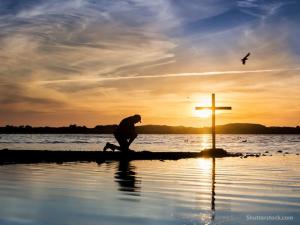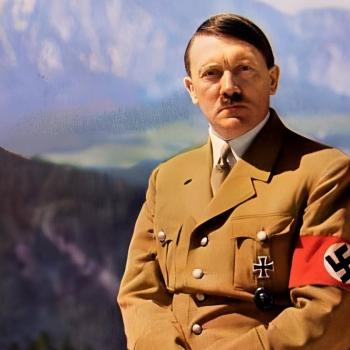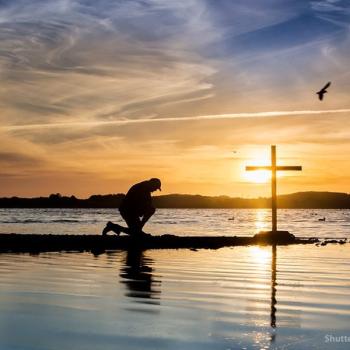 By Katie Kelaidis
By Katie Kelaidis
Christ is Risen!
As you are reading this, the Orthodox (or one might say Old Calendar) Easter has passed. The Lenten fast and the beautiful, but also grueling and frankly sometimes boring, liturgical remembrances of the Passion and Resurrection are over. There is nothing left in a theological and liturgical sense but an empty tomb. But I am writing this on Great and Holy Friday (“Good Friday” in the Western tradition), the day which commemorates Christ’s crucifixion and death. “He who hung the earth upon the water is today hung upon the Cross,” says the hymnography of the Eastern church.
While I am reluctant to speak for anyone beside myself, it feels safe to say it has been a particularly painful Lenten season for those of us who make our spiritual home in the Orthodox Christian tradition. The Russian invasion of Ukraine has seen Orthodox Christians visit unspeakable atrocities on other Orthodox Christians and bombs blessed by Orthodox clerics fall on churches and monasteries in the motherland of Slavic Orthodoxy.
I have been left wondering if the invasion of Ukraine and the subsequent behavior of Orthodox apologists for it, not least Patriarch Kirill of Moscow-the head of the Russian Orthodox Church, are not a kind of apocalypse that reveals our corporate sin in having indulged in all the absurd debates around gender and sexuality, tradition and modernity, that have dominated not only Orthodoxy, but seemingly the whole of Christianity for the past fifty years. I wonder if this is the horrific culmination of the sin of Culture War and if so, how we might repent of it.
To be clear, I am not so naive as to believe that for Vladimir Putin and his cronies the invasion of Ukraine is about anything other than a mercenary power grab aimed at re-drawing the map of Europe, but the highest-ranking Orthodox clerics in Russia (and frightfully sometimes Orthodox clerics and lay people beyond Russia’s borders) has provided this clearly unspiritual and pretty banal power grab with an air of religious authority by declaring that this is not a war about power and territory, but a battle in defense of “traditional values,” a struggle against a decadent and immoral West that has given license to all manner of sins (but, let’s be honest, mainly the sex ones).
This crisis has also laid bare for the world to see a struggle that has been going on within Orthodox Christianity for at least the past century, but arguably since the fall of Constantinople to the Ottomans in 1453. At the heart of this struggle is the question as to if and how, Orthodox Christians can reconcile themselves to liberalism and modernity. This struggle is not unlike the one we have seen within Islam, right down to the violent consequences. But in recent years this native conflict has also been coupled with Orthodox Christianity’s own theater in the Culture Wars. Because since the early 1990s, Western Christian debates surrounding “cultural issues,” particularly those pertaining to gender and sexuality, have been imported into the Orthodox world and these issues have quickly come to dominate the conversation, just as they did in Western Christendom. This has happened primarily in two ways: The conversion of conservative, Culture War-minded people from Western Christian traditions and the post-Soviet engagement of American Evangelicals with the Russian Orthodox Church.
The first–and most important way in the United States–has been through the conversion of politically conservative Evangelical and mainline Protestants (along with a healthy number of Catholics) to Orthodoxy. These conversions have been dominated by culture warriors who see in the Orthodox Church a bastion of unrelenting traditionalism in which they will never again be forced to defend their position against the ordination of women or the inclusion of LGBT people. The most high-profile American converts to Orthodox Christianity fit well within this profile including American Conservative editor and The Benedictine Option author, Rod Dreher and the “Bible Answer Man” himself, Hank Hanegraaff.
At the same time some American Evangelicals in the United States were finding their way in the Orthodox Church, others were heading to Russia in the wake of the collapse of the Soviet Union. There leading Evangelical figures, like Franklin Graham, have built powerful relationship with senior Russian Orthodox clerics, provided money, Bibles, and even (quite shockingly) religious education material, and taught the post-Soviet Russian Orthodox Church to speak the language of secular church power in the contemporary age: the language of the Culture Wars.
Patriarch Kirill’s gave now infamous Forgiveness Sunday sermon this year, in which he argued that Russia’s illegal invasion of Ukraine was justified in order to prevent “gay parades,” was the natural outcome of decades of engagements and rhetoric from the West which brought what were once peripheral (or even non-existent) issues to the center of Orthodox Christian life. These debates and the language of so-called traditional values, in which the Russian Orthodox Church and traditionalists throughout the Orthodox world have wrapped themselves, are now giving ideological cover to atrocities being committed by Orthodox Christians against other Orthodox Christians.
Certainly this battle has been fought from two sides, but one side’s position has allowed for the dehumanization of women, gender and sexual minorities, and frankly anyone who dare challenge any reactionary view with regard to cultural issues. This has, in turn, lead us to the point where Orthodox bishops can now justify, with completely straight faces, the murder of Orthodox Christians, in the midst of Lent and Holy Week, in the name of preventing “gay parades”.
But I am not letting those of us on the progressive side (and trust me, thinking of myself as progressive feels silly in the extreme, but I suppose here I am) off the hook, in hindsight, we took up our position incorrectly and in doing so allowed the situation to devolve to its current state. We decided this was a debate in which we clearly lacked the historical and theological upperhand. We were the nice ones, not the theologically sound ones. This self-perception led us to make our case only in the most conciliatory manner in whispered voices and in secret meetings. We indulged their cruelty, because we thought that they were ultimately the ones arguing from the most solid position within our tradition. We essentially agreed with them that reason, Holy Tradition, and The Truth (TM) were on their side. But this is not the case. As a professional historian, I know this is not the case and what precisely the whole of the Christian Scriptures and tradition has to say about gender and sexuality, particularly in our modern context, is open for a real debate, a debate that cannot permit the dehumanization of people made in the image of God, which is to say all people.
Furthermore, we should have been bolder in proclaiming our own experiences. For example, I should have just said, with no equivocation, “Actually, with the exception of my now-departed grandfather, the most consistent and exemplary Christian witnesses in my life have all been gay men (and if it matters, the vast majority of these have not been celibate, because thanks to this discussion it does matter). And any further argument you make has to account for that.” Because that’s the truth and the Christian practice, since those scared women left the empty tomb of Christ to “go and tell the disciples” has been to boldly proclaim your personal witness to the truth that you have seen. In not doing these things, we on the “progressive” side engaged in the cruelty and dehumanization that brought us to this point.
And so we have collectively made cruelty, violence, and absurdity our witness to the world, even as missiles are launched by our Russian brothers and sisters at our Ukrainian brothers and sisters. That is the reality at the front of my mind as I sit here at my computer awaiting the Resurrection of Christ.
One of the great benefits of having been raised in a liturgical tradition is that I have an intimate familiarity with the rhythms of the Church year. I know what I will hear and when I will hear it. Tomorrow night, I will will hear these words, chanted in the long and haunting syllables of Byzantine Greek:
This is the day of Resurrection!
Let us be illumined by the feast!
Let us embrace each other!
Let us call Brothers even those that hate us,
and forgive all by the resurrection…
It is my prayer that when I hear these ancient words that have returned to me each year of my life, I will try once again to see each human being, whether they agree with me or not, whether they hate me or not, in the light of the Resurrection. I pray that we all repent of war, rhetorical and literal, and of the ways in which we all contribute to a world that makes such atrocities possible.













